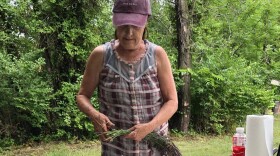-
An invasive insect called the rice delphacid was a major problem for some farmers in 2025. With low prices for their crop and a high cost of doing business, many are wondering how they’ll make a profit in 2026.
-
Thousands of volunteers in Missouri are trying to get enough signatures to force a statewide vote on a congressional map, which state lawmakers recently gerrymandered to favor Republicans. But state officials aren't making it easy for them. Plus: U.S. farmers are experimenting with short corn. It's corn, but shorter!
-
State fairs offer tradition, blue ribbons and fried classics like funnel cakes. And many fairgoers have traditions of their own. Harvest Public Media takes an audio tour of four state fairs around the Midwest. Also, Kansas is known for its massive wheat production, but it has fallen behind because of a lack of new hybrids. Seed companies and universities are making changes that could impact the farmers, and economy, of Kansas.
-
A Kansas City gardener had a light bulb moment: If she chose native plants for her yard, it would be better for wildlife. Now it’s home to birds, frogs, bees and many butterflies. Plus: Farmers have been taking on more debt, while their incomes have been shrinking over the last few years.
-
Agronomists at the University of Missouri have created a new cultivar of black walnut that grows faster and produces a better nut than the native black walnut tree. Missouri provides three-fourths of the country's native black walnuts.
-
For the hundreds of meteorology students at the University of Missouri, working for the National Weather Service was the dream until federal job cuts hit the National Oceanic and Atmospheric Administration. Plus: Firings at the U.S. Department of Agriculture have impacted research facilities across the Midwest.
-
Meet the aronia berry. It's native to North America, easy to grow in the Midwest and full of antioxidants: So why don’t more U.S. consumers know about it?
-
The price of beef is at all-time highs, but a major policy initiative of the incoming Trump Administration could drive them higher. In an industry that's already strapped for workers, mass deportations could put some ranchers and feedlots out of business.
-
The Kansas City region goes wild during the autumn months, with festivals and fall-themed events nearly every weekend. Find out where to pick pumpkins, sip cider, get confused in corn mazes and even celebrate spinach.
-
Autumn is perhaps the best time of year in the Midwest, and all around the Kansas City region, people are ready to celebrate. Whether you're pro-pumpkin or already in macabre mode (or both!), here are some must-do events throughout the season.
-
A highly concentrated beef market has meant higher prices for consumers and lower returns for the people raising the animals. Some ranchers in the Midwest and Great Plains want a new option by organizing their own processing plants.
-
The Steinegers are part of a wave of nontraditional farmers in Kansas and Missouri who taking chances on niche crops — motivated by spirituality, tourism and simply giving back to their communities.
Play Live Radio
Next Up:
0:00
0:00
Available On Air Stations








